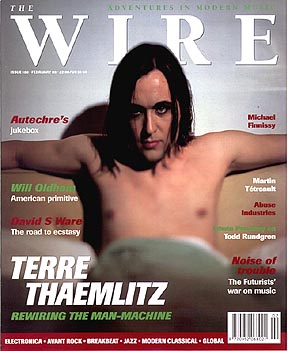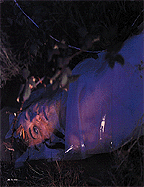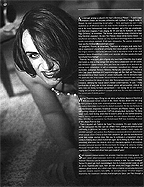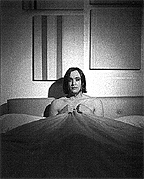|
press プレス |
|
TVpersonality Rewiring the Man-Machine (Cover story) - Rob Young |
Cover story in The Wire (UK), Issue 180, February 1999.
tvpersonality
American electronic musician-theorist Terre Thaemlitz mixes sexual politics and firebrand philosophy with some of the most ravishingly textured Electronica of the 90s. Words: Rob Young. Photography: Bart Nagel.

| S |
The revolution in telecommunications, media, intelligence gathering, and information processing... have coincided with an unprecedented sense of disorder and unease, not only in societies, states, economies, families, sexes, but also in species, bodies, brains, weather patterns, ecological systems. There is turbulence at so many scales that reality itself seems suddenly on edge. Centres are subsumed by peripheries, mainstreams overwhelmed by their backwaters, cores eroded by the skins which were once supposed to be protecting them. Master copies lose their mastery, and everything valued for its size and strength finds itself overrun by microprocessings once supposed too small and insignificant to count. - Sadie Plant, Zeroes + Ones
| "M |
When the Thämlitz ancestors moved to the United States of America in the 1870s, perhaps they were seeking a peaceful resettlement in the rapidly expanding economy of the US, as an escape from homelands that were just as rapidly disintegrating in a series of Polish uprisings. The latest in the family line - an electronic musician-philosopher, label runner and former DJ - Terre has experienced his share of solid ground shifting and collapsing under his feet. Which is the main reason why, after half a decade of music making in New York, he upped and relocated to Oakland, California at the end of 1997.
Terre (pronounced 'Terry') Thaemlitz only began composing and recording music in 1993, following a few years working the transsexual clubs of midtown Manhattan as DJ Sprinkles. As a tribute to the lost friends and evaporated spirit of those times, he recently released a DJ Sprinkles EP, Sloppy 42nds also elegizes the deactivated region of Times Square where the city's gay clubs had proliferated. Walt Disney Corp has since bought up all the real estate, and with it the title deeds to the neighborhood's morality.
| A |
At moments of innovative pressure, where the shape and form of culture itself is being called into question, gender too gets caught in the quake. It was a woman, Mary Shelley, who anticipated and formulated robot-age mythology when she novelized the Frankenstein monster; and another, Ada Lovelace, who bolstered Victorian computer engineer Charles Babbage with the intellectual fire that lifted him through years of despondency. Later, at the end of the First World War, conceptual artist Marcel Duchamp's playful personae anticipated modern music's one-person population explosions, by inventing the feminine alter ego Rrose Selavy. John Cage once reminisced about cruising the Palisades of Santa Monica during his formative years in LA; and Walter Carlos reconfigured Bach as a sequence of automated arpeggios on the Moog synthesizer, tricking him/herself out as Wendy into the bargain. Since the industrial revolution, sexuality has become the prime site for discussing and enacting rituals of liberation, domination, suppression, retention and release - and for the chaining or unshackling of identities.
"My interest in transgenderism and cross-dressing isn't anything essentialist about 'trying to be a woman', or trying to escape my body," says Terre. "Cross-dressing is totally about taking cultural signifiers and putting them out of context. For me, the interest in [1997's] Couture Cosmetique is the idea that clothing and behavior, all these things that we assume are so essential, and this natural reflection of ourselves as men and women, or based on gender assignment... to take those things and denaturalize them by using them out of context. In the same way that, with the computer music, I'm taking Andy Gibb samples and putting them out of context, that kind of becomes for me like cross-dressing, and transgenderism becomes the actualization of these ideas in a physical body way."
Transgendering, for Terre, is tied in to this unsteady sense of identity. "All through growing up, until I was 18 or so, every day being called (a) a girl, which is a gender assignment, and (b) a fag, which is a sexual assignment. And in this amazing way, by the time of the first grade, six years old, I was already being forced to sit at the girls' table at lunch. It was this strange thing that seemed to happen long before it made sense. I thought girls were just boys with long hair. So I think that's what's informed me and led me to this real emphasis on the social conditioning side of identity construction, as opposed to the nature type thing."
Wigged and powdered, sequined and sporting a neon-flashing throatchoker, Terre's DJ set at last October's Battery Park festival in Cologne brought a whole new twist to the term 'playing out'. Spinning almost without a break from 11pm until six o'clock the next morning, the hazy twilight hours melted into a quadraphonic sound diffusion of sine-smothered disco glitterbeats, with Kool and the Gang (pre-JT Taylor, natch), Bee Gees, Lonnie Liston Smith and the Cosmic Echoes fragments spraycanned with piercing tonalities, while Thaemlitz shifted them round the speakers and cleaved them apart in a disorienting 3D mix.
"The whole performer-audience paradigm is totally played out, and uninteresting to me," he says. Sure enough, when Terre drags up for one of his now rare public appearances, he's nothing like the camp-as-Christmas, 'get her" screamer archetype celebrated and nurtured by gay media. "I guess I'm kind of an anti-spectacle drag queen," he laughs. "I get dressed up and go out, and stay in the back of a club somewhere - not like the real extroverted, 'Here I am, honey!'"
Not outing so much as inning - coming out involves assimilation into a different but equally proscribed system of identity and lifestyle traits. "I don't see a resolution to that," laments Terre. "At the exact same time, take the very nature of avant garde music: electroacoustic music is a fringe commentary on pop culture, right? Once those signifiers change, when the transgender revolution hits, and everybody becomes a drag queen or king, or some sort of hermaphrodite, then all of the signifiers change again. All of the content and discourse would be wiped away, and that's why I don't like some sort of idyllic, teleological planning: 'This is the way of the future.' Everything is contingent on those power structures of repression."
| "I used to wear rhinestone chokers and bracelets all the time, with my Flock Of Seagulls hairdo. In Missouri, that wasn't a good thing for self safety" |
 |
| T |
Love For Sale functions as a lament for the way financial and economic issues are the keystone in making gay lifestyles acceptable to the American mainstream. It also describes, through the ripped fabrics and tattered tissues of its textures, the psychic shredding of one individual caught in the maelstrom of change, and on the horns of a dilemma about where his soul should follow. "I had a real difficult time dealing with what my subjectivity was in the era of political correctness in the late 80s and early 90s; trying to deal with what my identity was as an individual, versus my identity as a white male-type social thing... I basically went into this weird personal repression. Many people [involved in activism] by that time started burning out, and all these groups started dismantling. And part of that, which I tried to deal with in Love For Sale, was that it coincided invisibly with this shift towards a politics of representation, rather than a politics of self-actualization. Instead of being about grassroots organization, with ACT-UP [the US HIV awareness group AIDS Coalition To Unleash Power] it suddenly became about: 'Look, now people are picking up on our activist tactics, and people are listening to us, and we're able to go and have meetings with political representatives...' And that led to this alienation from political process again: we don't have to be on the streets anymore, marching and that sort of thing.
"The big thing these days," he goes on, "is that you get this huge list of e-mail names: 'Add your name to this and forward it to all your friends, this is really gonna make a change...' Half the time, the e-mail accounts aren't even active any more. For me, that's the real expression of this whole political conundrum we're in. It's the illusion of representation."
By the end of Love For Sale, Terre has indeed identified a particular problematic within queer culture and within himself, and has moved some way towards a resolution which is itself in flux, the conjuring of what he calls "an irresolvable sound which declares its presence at the same time as it eviscerates itself". It's hard to imagine a better description of his collected works.
| "M |
Aren't they also pre-emptive strikes launched against potential misreadings by the media? "Early on, I had a lot of problems, where press people were saying, 'Who does he think he is, telling us what his music means?' But the thing is not to pre-empt the media at all, but to be able to have a lyric sheet or something like that. You just have more information that is part of the project. So it's not an analysis of the project, but an integral part of it."
Few musicians write so eloquently about their own aims while identifying the inherent flaws, contradictions and limitations of their particular projects. His second solo album, Soil, on the American Ambient label Instinct, which whom he never quite saw eye to eye, featured only a close-up photo of a used condom lying on the ground instead of text. Later, Terre wrote of the title: "Soil as ejaculate, referencing the masturbatory nature of music production and 'artistic' or 'creative' processes... Soil as a cynical reference to spiritualist 'Mother Earth' Ambient music titles. Soil as an English translation of my first name from the French 'terre', avoiding the more romantic and universalist semiotics behind its common translation as 'earth'."
On Die Roboter Rubato, his 1997 collection of piano versions of Kraftwerk favourites ("Rubato: music performance that does not adhere to a strict sense of time" - this was cyborg-musik with its restraining bolt unscrewed), he wrote it up as an attempt to "construct a style and sound which reflects the complexity of thematics established by Kraftwerk over the past two and a half decades", intruding upon "Kraftwerk's meticulous clarity of technique" with "noise which distorts and clouds like interpretive processes."
| I |
"Yeah, there's a kind of schizophrenia to it," he says, "but I developed socially in this way that was about rigid splits in behaviour, and I think that I project that onto everything. Definitely for this kind of music, and this kind of media, and the whole idea of electroacoustics - post-processing of other people's materials - it's all about the mixture of other people's works. It creates this audio-slurry that is inherently between definitions."
| A |
In Springfield, Missouri, he remembers, "There was an emerging punk scene, but I was so suspicious of any sense of community that I would alienated myself even from the fringe's weirdos. I had to be different. I had t be unique. I had all this stuff invested in being different that I couldn't even associate with other people who might have shared those feelings."
Thaemlitz has since found allies in figures who have made it their life's duty to adapt and mutate as often as they change their shirts. Web, a collaboration with Bill Laswell, was released on Subharmonic in 1995; and Terre has cropped up on several of the ensuing Axiom compilations, as well as composing a soundtrack for a dialogue with psychedelic spokes man Terrence McKenna. He has also participated in a tribute to John Cage, played downtown NYC experimental gigs with Ben Neill and Tetsu Inoue, and beamed into a Future Sound Of London ISDN uplink. And he eventually made a connection with YMO founder Haruomi Hosono, whose Daisyworld label licensed Couture Cosmetique for release in Japan after Terre remixed one of Hosono's 1996 Interpieces. Admiring the tropical dandy's twisted career trajectory, he says: "I really love that idea of being able to move between genres and personalities, while at the same time not having to make a progression - not leaving the old one behind. Playing with personae like pieces of a puzzle all at once. For me, that's reflective of the current state of identity politics."
| W |
"Marx is equated with Stalin in the States," he complains. "It's weird, totally fucked up." He was sucked into, then spat out of New York's underground political activist community. In particular, he related to "health issues, women's health issues, and HIV/AIDS activism", and went on Clinic Defense, a necessary American phenomenon where groups of pro-Choice activists help people to get past the anti-abortionist picket lines outside abortion clinics. But now he confesses to "pessimism when it comes to thinking about activist involvement again. But by letting my nihilism keep me uninvolved, what does that mean in terms of a bourgeois agenda of personalized, alienated, existential dynamic? On the one hand, I'm trying to be active by creating discourse through these musical projects, but on the other, in terms of real organization, I've been kind of lost these past couple of years."
| S |
"The music that I do," says Terre, "has no inherent content, but the content comes out of the exchange between the consumer, their expectations and understandings of what they know about me, or what they know about electroacoustic music, or what they know about the CD store they bought it in, or whatever." When you buy a Terre Thaemlitz CD, a different relationship with the product is established: it refuses you the comfort of a beginning, middle and end that leave you satisfied, enlightened and ready to face the world with a greater understanding. Means From An End, one of two solo CDs he released last year, begins with a sequence of seven "Inelegant Implementations", where short jazz riffs are flayed and torn asunder as software processing chews through the music, abandoning it to contort in squiggly, writhing worm trails. The piece "Means From An End" itself uses a Duchampian delay/decoy strategy as you strain to listen through the tesserae of high-pitched frequencies that dog the foreground of the track to reach the beautiful melody slowly revolving in its hidden shadows, you can sense the music resisting your advances. "The 'Inelegant Implementations' is playing with that idea, with jazz cymbals [sic. 'symbols'] that are really harshly processed," comments Terre. "In academic electroacoustics, you do all these things that aren't really made for listening at all, but you force yourself to find the aestheticism in there. I was playing off the fact that these things could be on a marketed CD."
In his New York student days, Terre took part in several art subversion projects not unlike those perpetrated by Vienna's Sabotage organization. One of these is illustrated on the cover of Institutional Collaborative, the two-way exchange of sound files with journalist and computer musician Jane Dowe. With fellow conspirator John Consigli, he secretly installed a number of home-made 'beeping devices' in galleries and photographed their effects. "The beepers were in boxes that looked like explosive devices," he explains. "We stuck them under benches in modern art galleries, just to accentuate the whole institutional humming of the air ducts. The intent was to make the gallery visitors a little bit more aware of the whole institutional construction around them. So it wasn't that you were in this time portal looking at pieces of art that exist outside of space and time, but that the only way these things could be assembled is through the intense institutional, industrial mechanism of the museum and gallery space."
| W |
"There's two primary ways of doing electroacoustic music," he says. "One is where you use the software to calculate and generate wave patterns [from scratch], strictly based on formulas. And the other one is based on external source material, which is how I do most of my processing. I use found sound sources - taken off a CD or something like that - like the mathematical foundation of a process. Once you get the waves into your computer, you can run analyses on the waves, which are all just numbers, so what you end up with is this long string of numbers, and then you use software to apply different formulas, or edit, or change around those numbers and create a new sound file out of that, which is your post-processed sound. I look for the point where some combination between the processing power of my computer combined with the software creates some sort of glitch, and for me those glitches are the most real point in the process.
"Shareware's so brilliant, because so much of it is devised outside of a real marketing strategy. So it's not about stereophonic Dolby sound; it's about some undergrad student going off into some weird esoteric realm, and coming up with something that is full of good intentions that never quite deliver. And I think there's something in that very process that is a good political gesture. It's instantly deconstructing any idealist application of its use."
His favorite application is the curious program Argeiphöntes Lyre. "The graphic interface is really overdone, and it's full of all this pretentious French text everywhere, and filled with all this weird modernist philosophy, mixed in with directions on how to use it... It's really overwhelming, but at the same time you can do some really fun things with it if you're patient enough. And every function has some really looped-out name, totally removed from what it actually does."
| T |
"There's nothing natural about computer music - which I like. Because nothing's natural, and so that presumption is automatically taken away from me. You don't even have to deal with any of that baggage, or any 'natural' approach to production. It's kind of liberating for me. The conventional goal in media expression is to present something that has a singular content, a 'true meaning'. For me, the end result isn't supposed to be about a singular content, it's supposed to be about this state of existing in contradiction, and with these convoluted contents that don't really sync up and resolve, don't give you the satisfaction of walking away, saying, 'It's finished'. It's recognizing yourself in the state of incompletion."
The final paragraph: a content of conclusion, manifesting the desire for a construction of momentary closure . Otherwise known as: The End. [sic. taken from annotations to the track "End To A Means" from the album Means From An End.]
Love For Sale - Taking Stock In Our Pride is now out on Mille Plateaux, who also release Ultra-red's Second Nature CD this month. Fagjazz, a 2CD compilation of 12" tracks plus a collaboration with Taiwanese group Funk Shui, will be out in spring on Comatonse. Terre Thaemlitz' website is at www.comatonse.com


